Bachelor's Degree in Logistics Engineering and Industrial Organization

Cutting-edge training in flow management and industrial organization: Your gateway to the business world
The Bachelor's Degree in Logistics and Industrial Organization stands out as an innovative program in Spain, aligning closely with trends observed in prestigious international technological centers. This new degree equips students with the skills necessary to forge successful careers in one of the most contemporary and socially impactful fields, offering practical content that is highly relevant in today's society.
In addition to imparting essential technical competences, our program emphasizes hands-on practical training facilitated by industry experts. These professionals bring their knowledge and leadership acumen to the classroom, facilitating the launch of students' professional careers. Moreover, ethical values and sustainability are core concerns woven throughout the curriculum, reflecting our commitment to responsible business practices.
Why study the Grado en Ingeniería Logística y Organización Industrial

Distinctive Curriculum
Highly practical content designed for quality education with professors actively involved in the industry, fostering direct connections with the sector via the Bachelor's Degree Advisory Council. Real-world projects further enhance the learning experience.

Partnering with leading companies
DHL Express, Robert Bosch, CLH, Ferrovial, and Santander are among the companies and institutions offering professional internships to students. Their involvement in the curriculum ensures validation of the educational process, facilitated by expert professors.

International Education
Students have the opportunity to pursue part of their studies at internationally renowned universities in the sector, such as the University of Technology Sydney (Australia), San Diego State University (USA), or Hochschule München (Germany).

Final Project in a Professional Setting
Thanks to our internship agreements with some of the leading companies in the sector, students have the opportunity to complete their Final Research Project in a professional work environment or within the framework of our research groups.
Experience something extraordinary at the Higher Polytechnic School
If you are looking to embark on a once-in-a-lifetime endeavor, it begins at university.
If your goal is to make a transformative impact on the world, start with Nebrija's unparalleled education.
Curriculum
All our degrees and curricula have been meticulously developed in compliance with the latest legislative guidelines and have undergone verification by the National Quality Assessment Agency.
Each student is required to complete a total of 240 credits
First year 60 ECTS
First Semester 30 ECTS- 6 ECTS | Mathematics I
- 6 ECTS | Calculus I
- 6 ECTS | Physics I
- 6 ECTS | Graphic Expression I
- 6 ECTS | Chemistry
Second Semester 30 ECTS- 6 ECTS | Mathematics II
- 6 ECTS | Calculus II
- 6 ECTS | Physics II
- 6 ECTS | Graphic Expression II
- 6 ECTS | Business Organization
Second year 60 ECTS
First Semester 30 ECTS- 6 ECTS | Fundamentals of Computer Science
- 6 ECTS | Statistics
- 6 ECTS | Automatic Regulation
- 6 ECTS | Financial and Analytical Accounting
- 6 ECTS | Modes of Transportation
Second Semester 30 ECTS- 6 ECTS | Demand and Inventory Planning
- 6 ECTS | Quantitative Methods of Industrial Organization
- 6 ECTS | IT and Communications
- 6 ECTS | Thermodynamics
- 6 ECTS | Mechanics and Strength of Materials
Third year 60 ECTS
First Semester 30 ECTS- 6 ECTS | Logistics Center Operations
- 6 ECTS | Project Management
- 6 ECTS | International Trade and Logistics
- 6 ECTS | Business Information Systems
- 6 ECTS | Operations Management I
Second Semester 30 ECTS- 6 ECTS | Distribution Logistics Operations
- 6 ECTS | Supply Chain Planning
- 6 ECTS | Business Management
- 6 ECTS | Industrial Quality and Maintenance
- 6 ECTS | Purchasing and Logistics Contracts
Fourth year 60 ECTS
First Semester 30 ECTS- 6 ECTS | Smart Mobility and Logistics
- 6 ECTS | Design of Logistics and Transportation Networks
- 6 ECTS | Sustainability
- 6 ECTS | Investment and Financing Decisions
- 6 ECTS | Operations Management II
Second Semester 36 ECTS- 6 ECTS | Lead
- 6 ECTS | English
- 6 ECTS | Professional Internship
- 12 ECTS | Final Research Project
More info about the subjects
Specialization Diplomas from the Higher Polytechnic School
Our program offers the unique opportunity to integrate Specialization Diplomas, enabling students to enhance their education and increase their prospects with leading companies, both nationally and internationally, within their respective sectors.
We deliver our courses in a flexible hybrid format, blending face-to-face and online instruction. This approach allows students to conveniently balance their coursework with their studies.
Professors
| Profesores Professors | Porcentaje de Doctores Percentage of PhD holders |
| 12 | 75% |
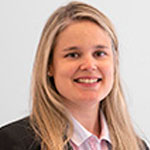 Aránzazu Garitagoitia Cid
Directora del Grado en Ingeniería Logística y Organización Industrial
Director of the Bachelor's Degree in Logistics Engineering and Industrial Organization
Aránzazu Garitagoitia Cid
Directora del Grado en Ingeniería Logística y Organización Industrial
Director of the Bachelor's Degree in Logistics Engineering and Industrial Organization
 Adrián Altamira Peña
Profesor del área de Expresión gráfica
Professor of the area of graphic expression
Adrián Altamira Peña
Profesor del área de Expresión gráfica
Professor of the area of graphic expression
 Carlos Augusto di Prisco de Venanzi
Profesor del área de Matemáticas Aplicadas
Professor of Applied Mathematics
Carlos Augusto di Prisco de Venanzi
Profesor del área de Matemáticas Aplicadas
Professor of Applied Mathematics
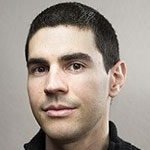 Omar Díaz Luque
Profesor del área de Fundamentos de la Física
Professor of the area of Fundamentals of Physics
Omar Díaz Luque
Profesor del área de Fundamentos de la Física
Professor of the area of Fundamentals of Physics
 Susana García García-Tuñón
Profesora del área de Empresa
Professor of Business Area
Susana García García-Tuñón
Profesora del área de Empresa
Professor of Business Area
 Jesús Carlos Guzmán Mínguez
Profesor del área de Química
Professor of Chemistry
Jesús Carlos Guzmán Mínguez
Profesor del área de Química
Professor of Chemistry
 Ingo Kaiser
Profesor del área de Fundamentos de la Física
Professor of the area of Fundamentals of Physics
Ingo Kaiser
Profesor del área de Fundamentos de la Física
Professor of the area of Fundamentals of Physics
 Francisco Martín San Cristóbal
Profesor del área de Expresión Gráfica
Professor of Graphic Expression
Francisco Martín San Cristóbal
Profesor del área de Expresión Gráfica
Professor of Graphic Expression
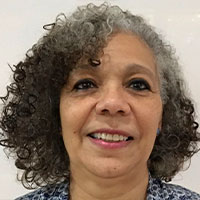 Brígida Coromoto Molina Carabaño
Profesora del área de Matemáticas Aplicadas
Professor of Applied Mathematics
Brígida Coromoto Molina Carabaño
Profesora del área de Matemáticas Aplicadas
Professor of Applied Mathematics
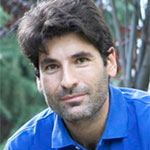 Juan Rubio Gómez
Profesor del área de Expresión Gráfica
Professor of Graphic Expression
Juan Rubio Gómez
Profesor del área de Expresión Gráfica
Professor of Graphic Expression
 Emilio Trigueros Páez
Profesor del área de Fundamentos de la Física
Professor of the area of Fundamentals of Physics
Emilio Trigueros Páez
Profesor del área de Fundamentos de la Física
Professor of the area of Fundamentals of Physics
More Academic Information
Official Degree: Bachelor's Degree in Logistics Engineering and Industrial Organization
Center responsible:Higher Polytechnic School
Branch of knowledge:: Engineering and architecture
Openings available: 45
Type of Teaching: Classroom attendance
Academic year in which it was implemented: 2024 - 2025
Languages: Spanish
University Services: [+info]
Competences Acquired from the Studies
- Ability to define and solve real-world problems requiring the application of knowledge in mathematics, physics, chemistry, or graphic expression, utilizing numerical algorithms and computational techniques when necessary.
- Proficiency in utilizing algorithms and models based on modern programming languages to automate data collection and analysis, thereby enhancing efficiency, effectiveness, and professional quality in logistics and industrial organization.
- Leadership in group projects, integrating collective knowledge to deliver cohesive solutions that incorporate contributions from all team members.
- Application and collaborative use of interdisciplinary knowledge within work teams, adapting to various logistics operations and industrial organizational settings.
- Integrate sustainability principles across all dimensions, with a specific focus on evaluating environmental challenges within logistics, transportation, and supply chain operations.
- Act ethically and responsibly in professional settings, demonstrating teamwork and leadership.
- Apply acquired knowledge and skills in practical settings, actively participating in Logistics Engineering and Industrial Organization teams.
- Utilize degree-acquired knowledge to develop, present, and defend projects within Logistics Engineering and Industrial Organization, synthesizing acquired competences effectively.
Admission Routes and Requirements
UNNE will publish on its website the places available for the first year of the Bachelor's Degree in Logistics Engineering and Industrial Organization. Below are the access routes to this Bachelor's Degree.
- 1. Students who have obtained a baccalaureate degree and passed the University Admission Tests are eligible to apply for admission.
- 2. Additionally, as stipulated in "Royal Decree 412/2014, of June 6, which establishes the basic regulations for admission procedures to official Bachelor's degree studies," the following students may also request admission to the University:
- a) Graduates of the European Baccalaureate or International Baccalaureate.
- b) Holders of Baccalaureate degrees, diplomas, or studies from educational systems of Member States of the European Union or other States with which international agreements are applicable.
- c) Holders of degrees, diplomas, or studies recognized as equivalent to the Baccalaureate degree under the Spanish Educational System, obtained or carried out in educational systems of non-EU States without international recognition agreements for the Bachelor's degree on a reciprocal basis, as per Article 4 of RD 412/2014.
- d) Students holding official diplomas of Higher Technician in Vocational Training, Higher Technician in Plastic Arts and Design, or Higher Sports Technician within the Spanish Educational System, or equivalent degrees approved under Spanish regulations, in accordance with Royal Decree 412/2014.
- e) Students holding degrees, diplomas, or studies other than those equivalent to Baccalaureate degrees, Higher Technician in Vocational Training, Higher Technician in Plastic Arts and Design, or Higher Sports Technician within the Spanish Educational System, obtained in a Member State of the European Union or in other States with which reciprocal international agreements are in place, provided they meet the academic requirements for university access in that Member State.
- f) Individuals who have successfully passed the university entrance test for applicants over 25 years of age.
- g) Individuals who have passed the access test to official Bachelor's degree studies for people over 40 years of age, based on accreditation of work or professional experience. Admission procedures for this route are detailed in "POA_9 Access Procedure for People Over 40 Years of Age."
- h) Individuals who have successfully passed the university entrance test for applicants over 45 years of age.
- i) Students holding an official Bachelor's, Master's, or equivalent degree.
- j) Students holding an official university degree of Associate's Degree, Technical Architect, Technical Engineer, Undergraduate, Architect, Engineer, corresponding to the previous organization of university education or an equivalent degree.
- k) Students who have completed partial foreign or Spanish university studies, or who have completed foreign university studies without obtaining homologation in Spain, and wish to continue their studies at a Spanish university. In this case, it is essential that UNNE has recognized at least 30 ECTS credits.
- l) Students who accessed university under regulations of the Spanish Educational System prior to the "Organic Law 8/2013, of December 9, for the improvement of educational quality."
- m) According to "Order ECD/1941/2016, of December 22, which determines the characteristics, design and content of the Baccalaureate evaluation for access to the University, the maximum dates for completion and resolution of the review procedures of the grades obtained, for the 2016/2017 academic year," its sole transitional provision states that passing the Baccalaureate evaluation test for university access is not necessary in the following cases:
- Students enrolled in a Baccalaureate course under the educational system defined by "Organic Law 8/2013, of December 9," who have subjects from the previous curriculum that were not passed before its implementation. They will take these subjects according to the curriculum of the previous educational system.
- Students who obtained their Baccalaureate degree in the 2015-2016 academic year but did not enroll in university at the end of that academic year.
In both cases, if these students do not take the entrance test, their grade for admission to official university degree studies will be the final grade obtained in their Baccalaureate studies.
For students with special educational needs arising from disabilities, evaluations will be conducted to determine necessary curricular adaptations, alternative study paths, or itineraries.
At UNNE, admission procedures adhere strictly to university legislation, emphasizing the core principles of access to Spanish universities: equality, merit, ability, universal accessibility, and alignment with the criteria of the European Higher Education Area. To apply for admission to any official Bachelor's degree program at the University, prospective students must complete the corresponding application via the University website or request it at any of the university campuses within the deadlines set by the Academic Development Department. Applications will only be processed for students who have submitted the required documentation within the specified deadlines outlined by the Admissions Department. Additionally, students may be requested to provide further information deemed necessary to assess their suitability for the Bachelor's degree program.
For pre-admission and admission evaluations, candidates will be assessed on a scale of 0 to 10 points, based on the following criteria and their respective percentages:
- Academic record from the student's educational background: 60%.
- Structured personal interview: 20%. The interview aims to assess the candidate's motivation, work ethic (consistency), training, knowledge, skills, aptitudes, attitudes, critical thinking, scientific curiosity, creativity, communication abilities, teamwork capability, extracurricular activities (such as music, sports, languages), and future aspirations relevant to pursuing a Bachelor's degree in Logistics Engineering and Industrial Organization at UNNE. The evaluation will also consider the candidate's experience, technical and professional skills necessary for their chosen field of study, motivation, attitudes, and other personal qualities contributing to their adjustment to the program. This interview will be conducted orally in Spanish.
- Multiple-choice Psychotechnical Test: 10%. This test assesses personality traits, exploring emotional, intellectual, social norms, and values relevant to each prospective student applying for the UNNE Bachelor's Degree in Logistics Engineering and Industrial Organization.
- Candidate Presentation Document: 5%. Candidates will prepare a personal document outlining their motivation and interest in the desired studies, along with any other relevant personal circumstances for the selection process.
- English Proficiency Test: 5%. Reflecting the competences outlined in the Bachelor's Degree in Logistics Engineering and Industrial Organization, an English proficiency test is included to evaluate adequate knowledge of the English language, both oral and written. The test comprises a comprehension exam with multiple-choice questions, conducted face-to-face or online in computer labs at each campus, supervised by teachers from the Institute of Modern Languages. Candidates may be exempt from this test if they provide a document certifying their English proficiency through official certifications recognized by the "Association of Language Centers in Higher Education" or the CEFR, valid for one year.
Admission tests are evaluated within a comprehensive strategy aimed at assessing applicant characteristics to determine if they possess the motivation, training, knowledge, skills, aptitudes, communication abilities, extracurricular activities, and future interests required for admission to the UNNE Bachelor’s Degree in Logistics Engineering and Industrial Organization curriculum.
The Admissions Committee will consist of the Vice-Rector for Academic Organization and Teaching Staff, the Director of University Development, the Dean of the School, and the Registrar of the University. Any of them may delegate their responsibilities to a designated representative within their respective departments.
In cases where the number of applicants exceeds available spots, unsuccessful candidates will be placed on a waiting list for potential vacancies that may arise before the start of the program. Selection for these vacancies will follow the previously outlined admission criteria. The Admissions Department will convene to select candidates based on the evaluation scale and will notify the results to candidates via email, telephone, and letter, prompting them to proceed with enrollment. The enrollment process will include the following phases:
- Place Reservation: Candidates are required to reserve their place by making a financial commitment. This reservation secures the candidate's spot at UNNE. The place reservation fee is non-refundable except in cases where the student is not definitively admitted, fails to meet the legal access requirements, or is unable to enroll at UNNE due to justified medical reasons.
- Enrollment: Pre-enrolled candidates seeking to finalize their academic enrollment at UNNE must complete the following steps within the specified deadlines:
- Submission of Documentation: Applicants must provide proof that they meet the requirements stipulated by Spanish university legislation to commence university studies.
- Formalization of Enrollment Process Online: The self-enrollment service available on the UNNE website enables admitted students to complete all academic, financial, and administrative procedures within specified deadlines. Upon receiving their admission letter, students will also receive an access code and personal password necessary for self-enrollment. Once self-enrollment is completed, the candidate obtains official student status at UNNE.
Students with non-university foreign studies pending homologation may be conditionally admitted to UNNE pending compliance with current regulatory requirements. Upon resolution of the homologation process, students must submit documentation proving completion. Failure to do so will result in voided admission, enrollment, and any exams taken, if applicable.
For Bachelor's Degree studies, students may enroll in a minimum of 45 ECTS credits and a maximum of 70 ECTS credits per academic year for full-time study, and a minimum of 12 ECTS credits and a maximum of 45 ECTS credits for part-time study. These limits apply to all modalities offered at UNNE (in-person, blended or hybrid, and distance learning). The Academic Department Director may authorize enrollment in a different number of credits for exceptional reasons.
Enrollment modification refers to any change made to a student's enrollment. If a student wishes to change their enrolled Degree, subjects, electives, or program, they must submit a written request to the Registrars for approval by the relevant Academic Department. Requests must be submitted within 15 days of the academic year's effective start or the beginning of the second semester. After this period, no further changes to enrollment will be permitted.
Employabilty
Career Opportunities
Upon completion of the Bachelor's Degree in Logistics Engineering and Industrial Organization, graduates will be able to develop their professional careers in:
Collaboration Agreements for Professional Internships
This Bachelor's program maintains collaboration agreements for professional internships with some of the top companies and institutions in the sector, among which are:
Employability recognized in the Rankings
The commitment of Nebrija University to the academic requirement, training in leading companies and institutions, innovation in multidisciplinary programs and international projection, places the University in the top positions of the most important rankings.
The International Ranking QS Stars awards Nebrija University the maximum score in the quality and satisfaction of students in teaching, employability of the graduates and the internationalization of the institution.
The national rankings also recognize Nebrija University as the first Spanish university in teaching and second in employability, highlighting its performance in research, knowledge transfer and internationalization.
The Bologna Declaration formalized the principles on which the European Higher Education Area should be based: quality, mobility, diversity, competitiveness and employment growth.
From this, Nebrija stands as an academic model of reference, educating students with excellent individual behavior, interaction with their environment and motivated by and for constant and continuous training. The Nebrija Institute of Professional Skills works every day to achieve the differentiation of our students through the development of attitudes and skills.
The main objective is for students to achieve the best of themselves through the development and empowerment of their personal skills and resources through personal self-knowledge.
In addition, some of the professional skills that are worked on within the three seminars are those related to interpersonal skills and active communication skills and negotiation, indispensable for our students to know how to transmit ideas, to argue them, to provide information and opinions in an adequate, clear and convincing way.
Within what will be their work performance, other aspects such as teamwork, conflict resolution and project management ability will be worked on.
In the third block, skills worked on are those aimed at increasing the student's employability. They will work with tools and techniques for job searching, and perform tasks that achieve in the student a greater use of their personal skills.
For all this we have currently active experts in selection of people, professionals dedicated to personal and professional training and professionals dedicated to the world of communication and the arts.
In this way, and in a complementary way to his/her specific training, we help the student create a differentiating pattern in the social and business environment in which he/she will be immersed when he/she finishes his/her studies.
International
The Department of International Programs at Nebrija University consistently monitors agreements with renowned universities worldwide.
Your Bachelor’s Degree in Logistics Engineering and Industrial Organization
Visit all the Activities of the Higher Polytechnic School
Launch of the autonomous vehicle
FEM Expert and Nebrija University are combining cutting-edge engineering with other fields such as computer science, ethics, psychology and legal issues related to the essential homologation of the vehicle in this transversal project.
Mathematics and Physics in the digital age
Session that addressed the challenges and opportunities of mathematicians and physicists in the digital age, interdisciplinarity, innovation and technology, as well as the bachelor's degrees in Applied Mathematics and Applied Physics (and its double degree) launched by the Nebrija University's Higher Polytechnic School.
Investiture ceremony of Carlos López-Otín as doctor honoris causa
Nebrija University named biochemist Carlos López-Otín a doctor honoris causa last Friday, November 18, in a ceremony that took place in the Conference Hall of the Madrid-Princesa Campus, and had Cristina Garmendia, president of the Cotec Foundation, PhD in Biological Sciences and former Minister of Science and Innovation, as the sponsor.
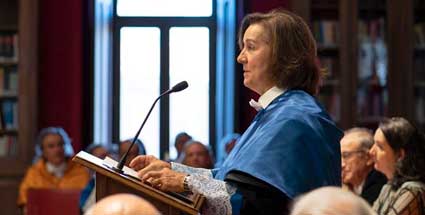
Pilar Vélez proclaims her passion for mathematics at the official opening of the 2022-2023 academic year
Devotion colored the atmosphere of the opening ceremony of the 2022-2023 academic year at the Madrid-Princesa Campus of Nebrija University. It was present in the gestures and in the words of the speeches of academic personalities and in the title of the inaugural lesson – Devotion to Mathematics. From great discoveries to the discovery of theorems – proclaimed by Pilar Vélez Melón, professor of Mathematics and director of the Mathematics and its Applications research group.
See newsWelcome Sessions for the 2022-2023 academic year
Nebrija University held Welcome Sessions aimed at new face-to-face bachelor's degree students for the 2022-2023 academic year.
The sessions took place on September 7, 8 and 9 and in them the students got to know the University, professors, departments, facilities and colleagues who will be part of their university life.
Bachelor's Degrees in Nebrija University's Engineering Area
Discover the Bachelor's Degrees of Nebrija University's Higher Polytechnic School

